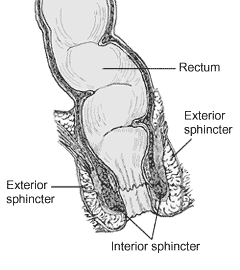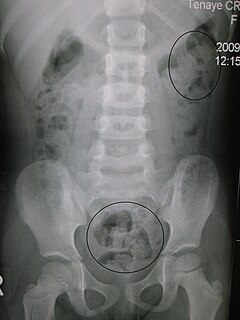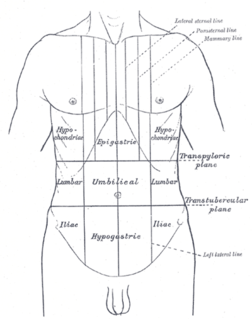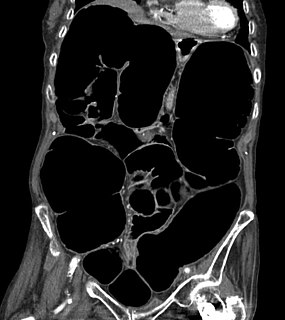Related Research Articles

Flatulence is defined in the medical literature as "flatus expelled through the anus" or the "quality or state of being flatulent", which is defined in turn as "marked by or affected with gases generated in the intestine or stomach; likely to cause digestive flatulence". The root of these words is from the Latin flatus – "a blowing, a breaking wind". Flatus is also the medical word for gas generated in the stomach or bowels. Despite these standard definitions, a proportion of intestinal gas may be swallowed environmental air, and hence flatus is not totally generated in the stomach or bowels. The scientific study of this area of medicine is termed flatology.

Defecation follows digestion, and is a necessary process by which organisms eliminate a solid, semisolid, or liquid waste material known as feces from the digestive tract via the anus. The act has a variety of names ranging from the common, like pooping, to the technical, e.g. bowel movement, to the obscene (shitting), to the euphemistic. The topic, usually avoided among polite company, can become the basis for some potty humour.

Prune belly syndrome is a rare, genetic birth defect affecting about 1 in 40,000 births. About 97% of those affected are male. Prune belly syndrome is a congenital disorder of the urinary system, characterized by a triad of symptoms. The syndrome is named for the mass of wrinkled skin that is often present on the abdomen of those with the disorder.

Peritonitis is inflammation of the localized or generalized peritoneum, the lining of the inner wall of the abdomen and cover of the abdominal organs. Symptoms may include severe pain, swelling of the abdomen, fever, or weight loss. One part or the entire abdomen may be tender. Complications may include shock and acute respiratory distress syndrome.

Constipation refers to bowel movements that are infrequent or hard to pass. The stool is often hard and dry. Other symptoms may include abdominal pain, bloating, and feeling as if one has not completely passed the bowel movement. Complications from constipation may include hemorrhoids, anal fissure or fecal impaction. The normal frequency of bowel movements in adults is between three per day and three per week. Babies often have three to four bowel movements per day while young children typically have two to three per day.

Abdominal pain, also known as a stomach ache, is a symptom associated with both non-serious and serious medical issues.
Functional gastrointestinal disorders (FGID), also known as disorders of gut–brain interaction, include a number of separate idiopathic disorders which affect different parts of the gastrointestinal tract and involve visceral hypersensitivity and motility disturbances.
Simeticone (INN), also known as simethicone (USAN), is an anti-foaming agent used to reduce bloating, discomfort or pain caused by excessive gas.
False pregnancy is the appearance of clinical or subclinical signs and symptoms associated with pregnancy although the individual is not physically carrying a baby. The mistaken impression that one is pregnant includes signs and symptoms such as tender breasts with secretions, abdominal growth, delayed menstrual periods, and subjective feelings of a moving fetus. Examination, ultrasound, and pregnancy tests can be used to rule out false pregnancy.

A volvulus is when a loop of intestine twists around itself and the mesentery that supports it, resulting in a bowel obstruction. Symptoms include abdominal pain, abdominal bloating, vomiting, constipation, and bloody stool. Onset of symptoms may be rapid or more gradual. The mesentery may become so tightly twisted that blood flow to part of the intestine is cut off, resulting in ischemic bowel. In this situation there may be fever or significant pain when the abdomen is touched.
In medicine, Meigs's syndrome, also Meigs syndrome or Demons–Meigs syndrome, is the triad of ascites, pleural effusion, and benign ovarian tumor. Meigs syndrome resolves after the resection of the tumor. Because the transdiaphragmatic lymphatic channels are larger in diameter on the right, the pleural effusion is classically on the right side. The causes of the ascites and pleural effusion are poorly understood. Atypical Meigs syndrome, characterized by a benign pelvic mass with right-sided pleural effusion but without ascites, can also occur. As in typical Meigs syndrome, pleural effusion resolves after removal of the pelvic mass.
Abdominal bloating is a short-term disease that affects the gastrointestinal tract. Bloating is generally characterized by an excess buildup of gas, air or fluids in the stomach. A person may have feelings of tightness, pressure or fullness in the stomach; it may or may not be accompanied by a visibly distended abdomen. Bloating can affect anyone of any age range and is usually self-diagnosed, in most cases does not require serious medical attention or treatment. Although this term is usually used interchangeably with abdominal distension, these symptoms probably have different pathophysiological processes, which are not fully understood.

Abdominal distension occurs when substances, such as air (gas) or fluid, accumulate in the abdomen causing its expansion. It is typically a symptom of an underlying disease or dysfunction in the body, rather than an illness in its own right. People suffering from this condition often describe it as "feeling bloated". Sufferers often experience a sensation of fullness, abdominal pressure, and sometimes nausea, pain, or cramping. In the most extreme cases, upward pressure on the diaphragm and lungs can also cause shortness of breath. Through a variety of causes, bloating is most commonly due to buildup of gas in the stomach, small intestine, or colon. The pressure sensation is often relieved, or at least lessened, by belching or flatulence. Medications that settle gas in the stomach and intestines are also commonly used to treat the discomfort and lessen the abdominal distension.

Ogilvie syndrome is the acute dilatation of the colon in the absence of any mechanical obstruction in severely ill patients.
Postcholecystectomy syndrome (PCS) describes the presence of abdominal symptoms after a cholecystectomy.
Hematocolpos is a medical condition in which the vagina is pooled with menstrual blood due to multiple factors leading to the blockage of menstrual blood flow. The medical definition of hematocolpos is 'an accumulation of blood within the vagina'. It is often caused by the combination of menstruation with an imperforate hymen. It is sometimes seen in Robinow syndrome, uterus didelphys, or other vaginal anomalies.

Polycarbophil calcium (INN) is a drug used as a stool stabilizer. Chemically, it is a synthetic polymer of polyacrylic acid cross-linked with divinyl glycol, with calcium as a counter-ion.
Ovarian diseases refer to diseases or disorders of the ovary.
Abdominal compartment syndrome (ACS) occurs when the abdomen becomes subject to increased pressure reaching past the point of intra-abdominal hypertension (IAH). ACS is present when intra-abdominal pressure rises and is sustained at > 20 mmHg and there is new organ dysfunction or failure. ACS is classified into three groups: Primary, secondary and recurrent ACS. It is not a disease and as such it occurs in conjunction with many disease processes, either due to the primary illness or in association with treatment interventions. Specific cause of abdominal compartment syndrome is not known, although some causes can be sepsis and severe abdominal trauma. Increasing pressure reduces blood flow to abdominal organs and impairs pulmonary, cardiovascular, renal, and gastro-intestinal (GI) function, causing obstructive shock, multiple organ dysfunction syndrome and death.
Anterior cutaneous nerve entrapment syndrome (ACNES) is a nerve entrapment condition that causes chronic pain of the abdominal wall. It occurs when nerve endings of the lower thoracic intercostal nerves (7–12) are 'entrapped' in abdominal muscles, causing a severe localized nerve (neuropathic) pain that is usually experienced at the front of the abdomen.
References
- ↑ Alvarez' syndrome at Who Named It?
- ↑ Alvarez WC (1947). "Marked abdominal bloating not due to gas but to a neurosis of the abdominal wall". Trans Assoc Am Physicians. 60 (1 vol): 86–91. PMID 18917246.
- ↑ Alvarez WC (Aug 1949). "Hysterical type of nongaseous abdominal bloating". Arch Intern Med . Chicago. 84 (2): 217–245. doi:10.1001/archinte.1949.00230020020002. PMID 18138437. Archived from the original on 2011-07-26. Retrieved 2010-07-02.